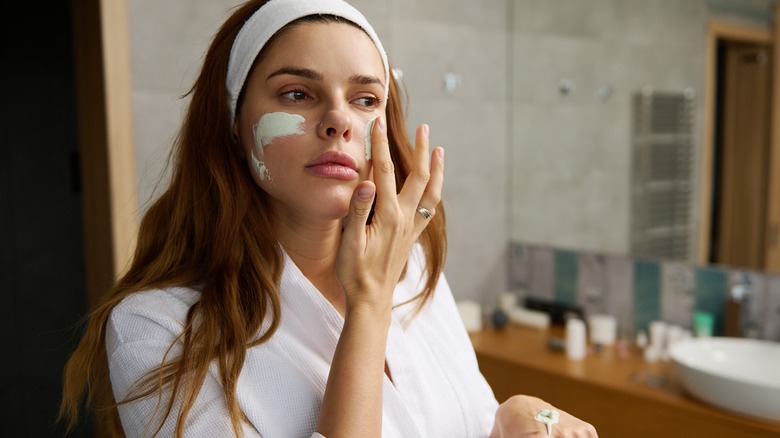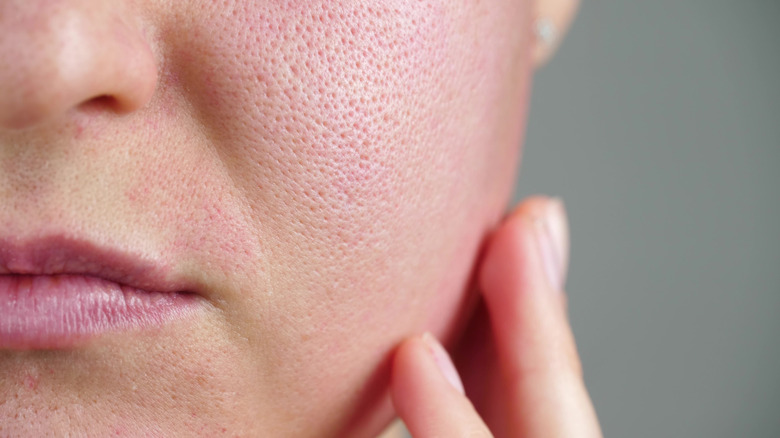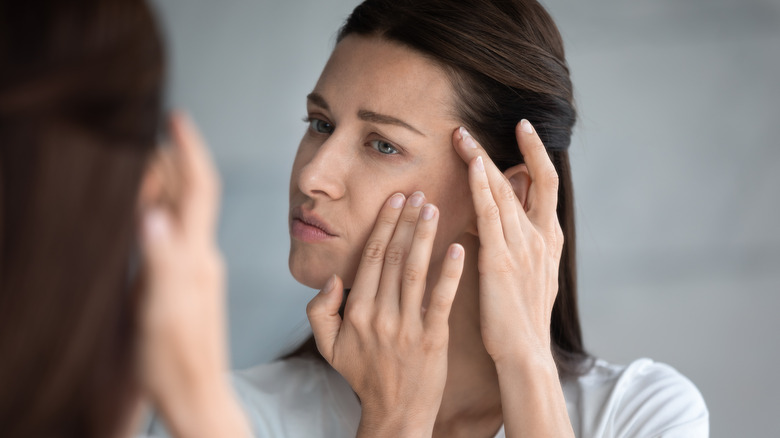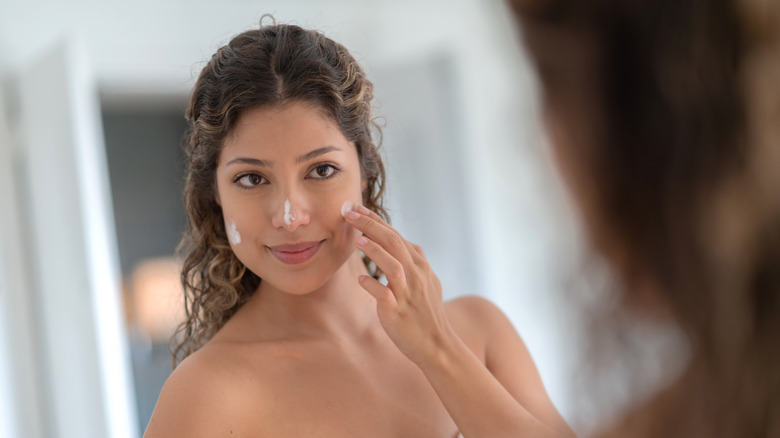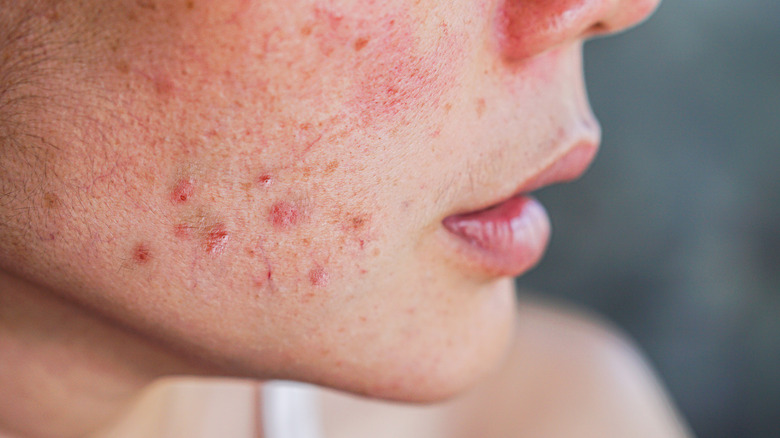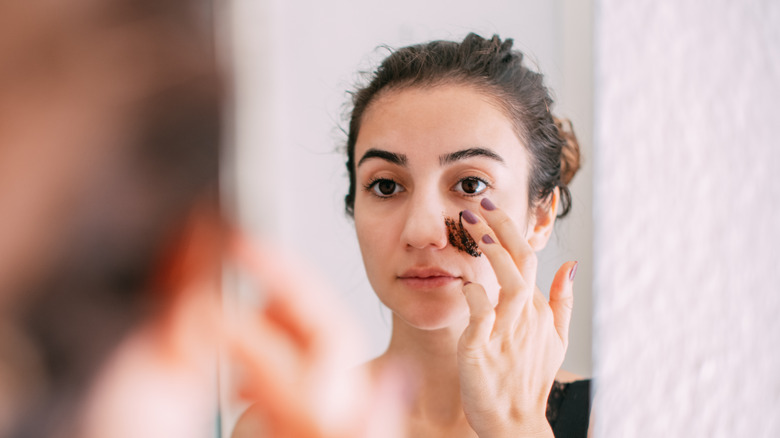The Mistakes You Don't Want To Make When Exfoliating (Trust Us, It's Not Worth It)
Exfoliating can be one of the most relaxing parts of a self-care or skincare routine. Whether you choose a physical exfoliant or a chemical one, you'll likely feel refreshed after giving your skin a nice but gentle scrub. However, it's also arguably one of the easiest parts to mess up, as just starting it with no prior knowledge about what to avoid — like exfoliating too hard or too often, or not applying moisturizer afterward — could turn into trouble. One small mistake and you could find yourself with irritated or broken skin.
Thankfully, these aren't unfixable or unlearnable mistakes. After all, what is a skincare journey without a few mishaps along the way? Most of your exfoliation woes boil down to simple mistakes that are easy to spot and alleviate. The most important piece of advice that we hope to bestow is if you're left with any lingering questions, talk to your dermatologist or esthetician to find out what type of exfoliation, if any, would work best for you. After getting that second opinion, you'll be able to pinpoint what exactly you're doing wrong and how precisely to fix it.
Exfoliating too hard
Arguably the most common mistake you can is how you're actually exfoliating. Far too often, we accidentally exfoliate too hard or too fast in an effort to get one specific area as clean and smooth as possible. As board-certified dermatologist, Dr. Rebecca Marcus explained to Sunday Edit, "Scrubbing too hard will cause micro-tears in the skin and can leave it red and raw. It can also stimulate the skin to produce more oil and keratin in an attempt to protect/repair itself from harsh scrubbing."
The solution to this problem lies in a universally taught saying: slow and steady wins the race. When using a physical exfoliator, use your hands and softly massage the product across your skin. You want to gently polish your skin, not scrub it as if you're scouring your dirty pots and pans. Continue with this process until you feel properly exfoliated, then rinse off your face with cold water as normal. Delicacy is key when it comes to exfoliating so as not to irritate or break the skin — after all, the purpose of exfoliating is to get rid of dead skin particles, not healthy ones!
Not applying moisturizer afterward
The process of exfoliation opens up your pores a significant amount, as it helps to unclog them from toxins or dead skin. Your skin is also stripped of many of its natural oils when you exfoliate, so rehydrating it is crucial for maximizing the benefits of the practice. Not only that, but your skin is more sensitive after exfoliation, so moisture is crucial to ensuring that the skin barrier is restored. If it isn't, then you risk your skin becoming dried out
The best course of action is to apply moisturizer immediately after you have cleansed and exfoliated your face. Dr. Joshua Zeichner, a New York-based dermatologist and director of cosmetic and clinical research in dermatology at Mount Sinai Hospital explained to The Washington Post that it's a good idea to use a post-exfoliation moisturizer with soothing ingredients like ceramides, oatmeal, or skincare favorite, niacinamide. If you aren't sure what to look for, Dr. Zeichner suggested products made by CeraVe, La Roche-Posay, and Aveeno.
Not wearing sunscreen after exfoliation (if doing so during the day)
What good is exfoliation if you don't protect your skin from the UV rays you're exposed to on a daily basis? Much like how you shouldn't skip out on your moisturizer after exfoliating, you shouldn't forget to apply your sunscreen. This is because your skin temporarily has an open skin barrier and is more sensitive, making you more prone to sunburn, which makes it hard to resume your skincare routine. More importantly, though, it increases your risk of developing a number of problems down the road, including premature aging and cancer. As such, freshly exfoliated skin is going to need even more protection than it already needs on a regular basis.
Skincare Lab states that sunscreen at night isn't necessary, so you can skip this step if you enjoy exfoliating before heading to bed. That being said, if you do it to start your day, incorporate sunscreen into your post-exfoliation routine as soon as possible. It is probably best to apply it after you apply your moisturizer. This is to reduce any potential irritation that could arise from putting sunscreen directly on a sensitive area of the skin. If you are planning on being outside for long periods of time, re-apply sunscreen at regular intervals.
Too much exfoliation
Something that is important to reiterate about exfoliation is that it can be best compared to a nice dessert. While you would like to have it every day, it probably isn't in your best interest as a daily practice. Exfoliation is meant to slough off dead skin cells as a way to get dirt and other impurities out of pores. Board-certified dermatologist, Dr. Lian A. Mack told Rose Inc. that exfoliating every day could irritate your skin, as the skin barrier needs time to breathe and reconstruct itself after the cleanse.
How much you should exfoliate, therefore, depends on your unique skin type. Those with more dry or sensitive skin are recommended to exfoliate gently no more than twice a week, while normal or combination skin can handle exfoliation every other day. Also, on the days when you do exfoliate, make sure that you are only doing it once per day — you can exfoliate in the morning for a refreshing start, or you can cap off your day with a night-time scrub.
Using or misusing the wrong exfoliators
Much like how different skin types need different exfoliation schedules, they will also need different exfoliators in general. Not every type of exfoliator is created equal, especially not when it comes to creams or chemical products used to really get into the pores. If you use a product that isn't particularly meant for your skin type, then the skin could become even more irritated or inflamed.
This is where it may be helpful to do some research or talk to a dermatologist about your skin type and what could work best for you. For example, if you have sensitive skin, Healthline suggests using only a mild chemical exfoliator, rather than an abrasive physical exfoliator. Normal or combination skin types can get away with using both physical and chemical exfoliants, while more oily skin is better off with physical ones. On a similar note, dermatologist and skin care expert Dr. Jeanette Graf explained to Insider that it's important not to layer or stack different exfoliators together — avoid combining chemical and physical products together or using more than one at once.
